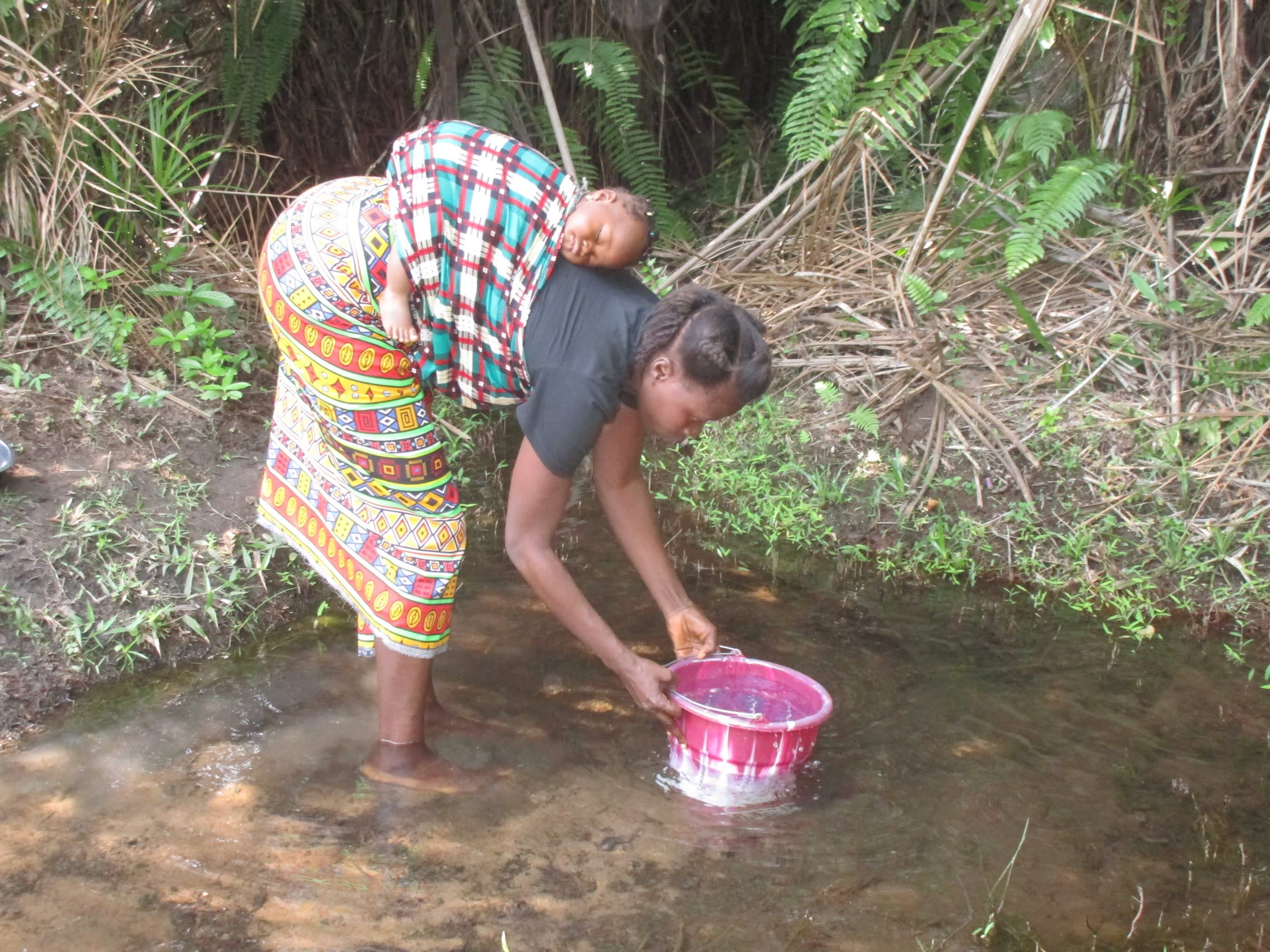The 111 community members in Petifu Junction experience a daily water crisis that disturbs their schedule and productivity. People spend too much time and energy searching for and collecting water, leaving them exhausted and unable to be successful in their livelihoods of palm oil production and subsistence farming, which both require large amounts of water.
The primary water source is the swamp, but understandably, its green, algae-filled water presents several problems. The swamp is open to contamination by humans, domestic animals, and wildlife alike. The same place where people collect water for drinking and domestic activities like cooking is also the place where animals drink and defecate, and people launder their clothes and bathe. People report experiencing water-related health issues such as typhoid, diarrhea, and skin rashes from using and consuming the water. To top it off, the waterpoint is far from the community, and hard to access.
The water crisis is especially felt during the dry season when the swamp water lessens, making domestic activities such as cooking and laundry harder to complete and personal hygiene harder to maintain.
"Early in the morning, when I wake up from bed, I have to sweep the house. After that, I must collect my rubber bucket [and] rush to the stream to fetch water. I must make many trips, but the distance to the swamp [is] far away from my house," said 30-year-old petty trader Aminata Kamara, shown below collecting water with her child on her back.

"I must bathe my children [and] then prepare them for school. I am a businesswoman. I usually sell cookery in the village, [but] because of [the] water problem, I do not embark on my daily business. Also, I must work on my housework activities such as fetching drinking water, laundering my children’s clothes, preparing food, fetching water to bathe, etc. Because of [the] water crisis in the community, I hardly complete these tasks on time," said Aminata.
Children are not immune to the challenges. Sometimes they decide to hide away at relatives' homes to avoid the pressure of fetching water, which means they also regularly miss school. And lactating mothers often leave their babies at home while collecting water to make the task less strenuous, but since it takes so much time, their children cry with hunger, waiting for their mothers to return.
 "When I wake up in the morning, I must collect my rubber bucket and then rush to the stream," said 14-year-old Alimamy K., shown to the right carrying water. "I usually take my bath at the stream before fetching water to return home. I must prepare for school. During the weekend, I must gather my clothes to launder and fetch enough water [for] at home. I will be tired at that time, which causes me to go to bed earlier."
"When I wake up in the morning, I must collect my rubber bucket and then rush to the stream," said 14-year-old Alimamy K., shown to the right carrying water. "I usually take my bath at the stream before fetching water to return home. I must prepare for school. During the weekend, I must gather my clothes to launder and fetch enough water [for] at home. I will be tired at that time, which causes me to go to bed earlier."
Alimamy continued, "The road leading to the stream is a footpath and bush road. It is hard to walk on. I am always afraid of snakes. Usually, snakes get close to the road looking for prey."
Hopefully, by installing a well, the community's issues presented by the swamp can be solved, and adults like Aminata and children like Alimamy can focus on improving their daily lives.
"I would be very much happy if this project digs [a] well in my community," concluded Aminata.
What We Can Do:
New Well
Where we will be drilling is centrally located and will relieve many people of the long journey to fetch water and the challenge of accessing clean water.
Our team will drive over the LS200 mud rotary drill rig and set up camp for a couple of nights. Once the well is drilled to a sufficient water column, it will be cased, developed, and then tested. If these tests are positive, our mechanics will install a new India Mark II pump.
By drilling this borehole, Petifu Junction and the surrounding community will be provided with plenty of accessible, clean drinking water.
Training
There will be hygiene and sanitation training sessions offered for three days in a row.
Community members will learn how to make a hands-free handwashing station called the "tippy-tap." We will use these tippy taps for handwashing demonstrations and will also teach about other tools like dish racks and the importance of properly penning in animals. We will highlight the need to keep restrooms clean, among many other topics.
This training will also strengthen a water user committee that will manage and maintain this new well. They will enforce proper behavior and report to us whenever they need our help in solving a serious problem, like a pump breakdown.

 Borehole Well and Hand Pump
Borehole Well and Hand Pump
 Rehabilitation Project
Rehabilitation Project














